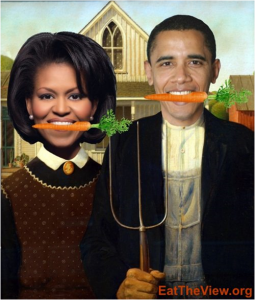FDA to clean up front-of-package mess
The FDA has a new “Dear Industry” letter announcing that it is going to set some rules for those “better-for-you” stickers on the front of junk food packages. Why? “FDA’s intent is to provide standardized, science-based criteria on which FOP [front of package] nutrition labeling must be based.”
What this is about, of course, is all those self-endorsement labels food companies like PepsiCo (Smart Spot), Kraft (Sensible Solution), and many companies collectively (Smart Choices) have been putting on their products.
The companies set up their own nutrition criteria and then applied those criteria to their own products. Surprise! A great many of their products qualified for the “better-for-you” labels.
I’m guessing Smart Choices was the final straw for the FDA. The idea that the Smart Choices check mark could go onto Froot Loops was so astonishing, and the subject of so much ridicule, that the FDA had to act. If nutrition criteria are developed independently, most junk foods would not qualify.
The FDA also says it will be testing how well consumers understand different kinds of package labels. It gives a bunch of examples. Want to know how the FDA is thinking about this? Check out its handy backgrounder, which if nothing else is an excellent introduction to the entire issue of front-of-package labels.
Have a preference about what to use? Write the FDA at this address:
Division of Dockets Management (HFA-305), Food and Drug Administration, 5630 Fishers Lane, rm. 1061, Rockville, MD 20852. All comments should be identified with the title of the guidance document: Guidance for Industry: Letter Regarding Point of Purchase Food Labeling.
Addendum, October 22: Here are two additional documents to add to the collection. First, a letter to representative Rosa DeLauro responding to her complaint about the Smart Choices program. Second, is a a summary of the talking points used by Commissioner Margaret Hamburg in her press conference on the new FDA initiatives. My conclusion: the FDA is back on the job!
It’s about time the FDA got back on the job. This is in reaction to the self-endorsements food companies have been making on package labels. The way this works is that companies set up their own nutrition criteria and then apply those criteria to their own products. Guess what. Lots of their products qualify for better-for-you labels. Examples: PepsiCo (Smart Spot) and Kraft (Sensible Solution), and now lots of companies working together (Smart Choices). I think Smart Choices was the final straw for the FDA. The idea that its check could go onto Froot Loops made it clear that the bar had to be set higher. Yes, they are suggesting something voluntary, but if the nutrition criteria are honest enough, junk foods won’t qualify.



